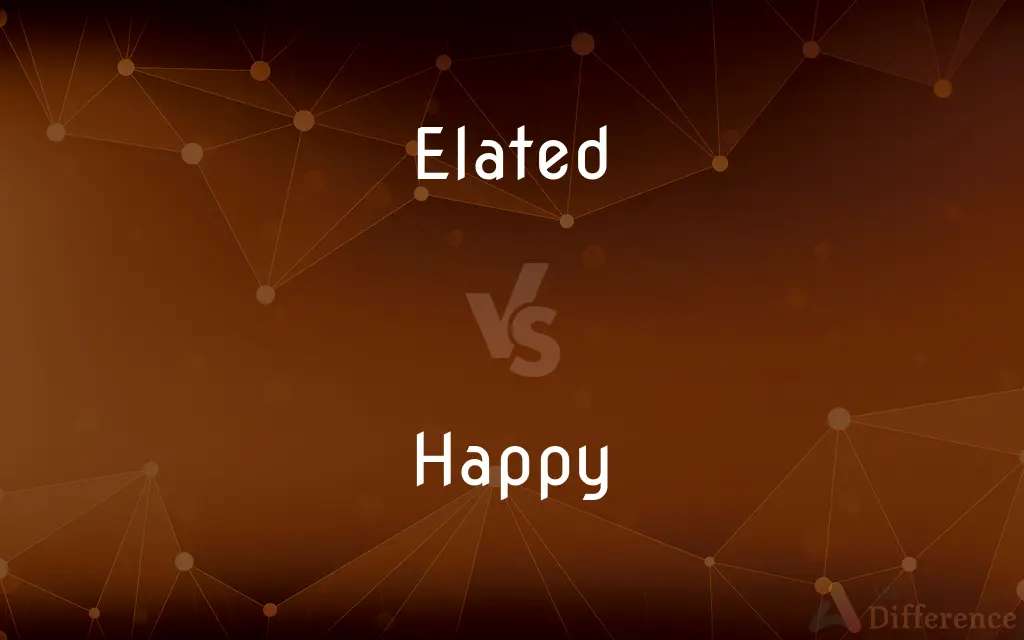Elated vs. Happy — What's the Difference?
By Tayyaba Rehman & Fiza Rafique — Updated on March 28, 2024
Elated describes a state of ecstatic joy or pride, often temporary and intense, whereas happy denotes a general feeling of contentment or pleasure.

Difference Between Elated and Happy
Table of Contents
ADVERTISEMENT
Key Differences
Elated and happy are terms often used to describe positive emotions, but they differ in intensity and duration. Being elated refers to a high level of joy or exhilaration, typically resulting from a specific event or achievement. This state is often more intense and usually more temporary than being happy. For example, someone might feel elated after receiving great news, like a job promotion or winning an award. On the other hand, happiness is a broader, more enduring state of contentment and well-being that doesn't necessarily depend on a particular cause or moment.
While elation is often associated with moments of peak joy, happiness can be seen as a more stable and continuous state of positive emotion. Happiness can stem from various aspects of life, including relationships, personal achievements, or even one's general outlook on life. In contrast, elation is usually triggered by specific events or achievements that exceed expectations, leading to a temporary feeling of immense joy and pride.
The expression of these emotions can also differ. Elated individuals might show their emotion through more expressive behaviors, such as jumping for joy, cheering, or other overt physical expressions. Meanwhile, happiness might be expressed in a more subdued manner, such as smiling, a calm demeanor, or a general sense of peace and satisfaction.
Both elation and happiness play significant roles in human well-being, but they impact mental health and life satisfaction in different ways. Elation, with its intense but short-lived nature, can provide memorable peaks of joy that enhance one's overall sense of life satisfaction. However, its fleeting nature means it can't sustain one's well-being alone. Happiness, being more enduring, contributes more significantly to an individual's overall quality of life and mental health stability.
In everyday language, people might use "happy" to describe their general mood or outlook, indicating a state of contentment with life or the situation at hand. "Elated," however, is reserved for those special moments that bring intense joy, underscoring the heightened and often temporary nature of this emotion. For instance, while one might be happy to spend time with friends, they might feel elated to learn their best friend is getting married.
ADVERTISEMENT
Comparison Chart
Intensity
High, intense emotion
General, moderate emotion
Duration
Temporary, short-lived
Long-lasting, enduring
Trigger
Specific events or achievements
Broad, can be general or specific
Expression
Overt, expressive behaviors
Subdued, calm demeanor
Impact on Well-being
Enhances life satisfaction with peaks of joy
Contributes to overall quality of life
Compare with Definitions
Elated
Momentary Bliss.
He was elated to find out he had passed the exam with flying colors.
Happy
Contentment.
She felt happy living in the quiet countryside.
Elated
Peak Happiness.
They were elated on their wedding day, surrounded by friends and family.
Happy
Satisfaction.
They're happy with the renovations to their home.
Elated
Triumph or Success.
The team was elated after winning the championship game.
Happy
Positive Mood.
The happy child played in the park all afternoon.
Elated
Intense Joy.
She felt elated when her artwork was featured in a prominent gallery.
Happy
Pleasure.
They were happy to spend the evening at home, watching movies.
Elated
Euphoria.
The elated crowd cheered as the astronaut returned home.
Happy
General Well-being.
He's been happy since he started his new job.
Elated
Exultantly proud and joyful.
Happy
Feeling or showing pleasure or contentment
They are happy to see me doing well
Melissa came in looking happy and excited
We're just happy that he's still alive
Elated
Extremely happy and excited; delighted; pleased, euphoric.
She was elated with her new car.
Happy
Fortunate and convenient
He had the happy knack of making people like him
Elated
Simple past tense and past participle of elate
Happy
Inclined to use a specified thing excessively or at random
They tended to be grenade-happy
Elated
Exultantly proud and joyful; in high spirits;
The elated winner
Felt elated and excited
Happy
Enjoying, showing, or marked by pleasure, satisfaction, or joy
A happy child.
The happiest day of my life.
Elated
Full of high-spirited delight
Happy
Cheerful; willing
Happy to help.
Happy
Characterized by good luck
A happy sequence of events.
Happy
Being especially well-adapted; felicitous
A happy turn of phrase.
Happy
Characterized by a spontaneous or obsessive inclination to use something. Often used in combination
Trigger-happy.
Happy
Enthusiastic about or involved with to a disproportionate degree. Often used in combination
Money-happy.
Clothes-happy.
Happy
Having a feeling arising from a consciousness of well-being or of enjoyment; enjoying good of any kind, such as comfort, peace, or tranquillity; blissful, contented, joyous.
Music makes me feel happy.
Happy
Experiencing the effect of favourable fortune; favored by fortune or luck; fortunate, lucky, propitious.
Happy
Content, willing, satisfied (with or to do something); having no objection (to something).
Are you happy to pay me back by the end of the week?
Yes, I am happy with the decision.
Happy
(Of acts, speech, etc.) Appropriate, apt, felicitous.
A happy coincidence
Happy
(in combination) Favoring or inclined to use.
Slaphappy, trigger-happy
Happy
Dexterous, ready, skilful.
Happy
Implying 'May you have a happy ~' or similar; used in phrases to wish someone happiness or good fortune at the time of a festival, celebration, or other event or activity.
Happy birthday!, Happy Fourth of July!, Happy anniversary!, Happy job-hunting!
Happy
A happy event, thing, person, etc.
Happy
Often followed by up: to become happy; to brighten up, to cheer up.
Happy
Often followed by up: to make happy; to brighten, to cheer, to enliven.
Happy
Favored by hap, luck, or fortune; lucky; fortunate; successful; prosperous; satisfying desire; as, a happy expedient; a happy effort; a happy venture; a happy omen.
Chymists have been more happy in finding experiments than the causes of them.
Happy
Experiencing the effect of favorable fortune; having the feeling arising from the consciousness of well-being or of enjoyment; enjoying good of any kind, as peace, tranquillity, comfort; contented; joyous; as, happy hours, happy thoughts.
Happy is that people, whose God is the Lord.
The learned is happy Nature to explore,The fool is happy that he knows no more.
Happy
Dexterous; ready; apt; felicitous.
One gentleman is happy at a reply, another excels in a in a rejoinder.
Happy
Enjoying or showing or marked by joy or pleasure or good fortune;
A happy smile
Spent many happy days on the beach
A happy marriage
Happy
Experiencing pleasure or joy;
Happy you are here
Pleased with the good news
Happy
Marked by good fortune;
A felicitous life
A happy outcome
Happy
Satisfied; enjoying well-being and contentment;
Felt content with her lot
Quite happy to let things go on as they are
Happy
Exaggerated feeling of well-being or elation
Happy
Well expressed and to the point;
A happy turn of phrase
A few well-chosen words
A felicitous comment
Common Curiosities
Do material possessions make people elated or happy?
Material possessions might bring temporary elation, especially if they're desired items, but lasting happiness is usually derived from non-material aspects of life.
Is elation better than happiness?
Not necessarily better, just different. Elation is more intense but short-lived, while happiness is more about enduring contentment.
How can I become happier?
Happiness is often linked to factors like relationships, meaningful work, and a positive outlook. Practices like gratitude can also enhance happiness.
Can the absence of happiness lead to illness?
Chronic unhappiness can impact physical and mental health, potentially leading to conditions like depression, anxiety, and heart disease.
Is happiness a choice?
While certain aspects of happiness may be influenced by choice or outlook, external factors and mental health conditions can also play significant roles.
Is elation always a positive experience?
While generally positive, elation can sometimes lead to impulsive decisions if not tempered by reflection or consideration.
Can pets be happy or elated?
Pets can exhibit behaviors indicative of happiness and, in specific moments, may show signs of elation, such as excitement upon their owner's return.
Does achieving one's goals always lead to happiness or elation?
Achieving goals can lead to moments of elation and contribute to overall happiness, but it's also the journey and personal growth that bring fulfillment.
Does social media affect our happiness and elation?
Social media can impact emotions, sometimes positively by connecting with others, but it can also lead to comparison and dissatisfaction.
How does culture influence expressions of happiness and elation?
Cultural norms and values shape how openly happiness and elation are expressed, as well as the sources from which they are derived.
Can someone be elated and happy at the same time?
Yes, elation can be seen as a heightened state of happiness; one can feel elated about a specific event while generally happy.
Can too much happiness or elation be harmful?
Constant pursuit of high-intensity happiness (elation) might lead to neglect of deeper, more meaningful aspects of well-being.
How long does elation last?
The duration of elation varies depending on the individual and context but generally fades more quickly than the broader state of happiness.
Is it possible to measure happiness or elation?
While subjective, researchers use various tools and surveys to gauge aspects of happiness and elation, acknowledging the complexity of these emotions.
Share Your Discovery

Previous Comparison
Qualities vs. Womanhood
Next Comparison
Heaven vs. SkyAuthor Spotlight
Written by
Tayyaba RehmanTayyaba Rehman is a distinguished writer, currently serving as a primary contributor to askdifference.com. As a researcher in semantics and etymology, Tayyaba's passion for the complexity of languages and their distinctions has found a perfect home on the platform. Tayyaba delves into the intricacies of language, distinguishing between commonly confused words and phrases, thereby providing clarity for readers worldwide.
Co-written by
Fiza RafiqueFiza Rafique is a skilled content writer at AskDifference.com, where she meticulously refines and enhances written pieces. Drawing from her vast editorial expertise, Fiza ensures clarity, accuracy, and precision in every article. Passionate about language, she continually seeks to elevate the quality of content for readers worldwide.















































